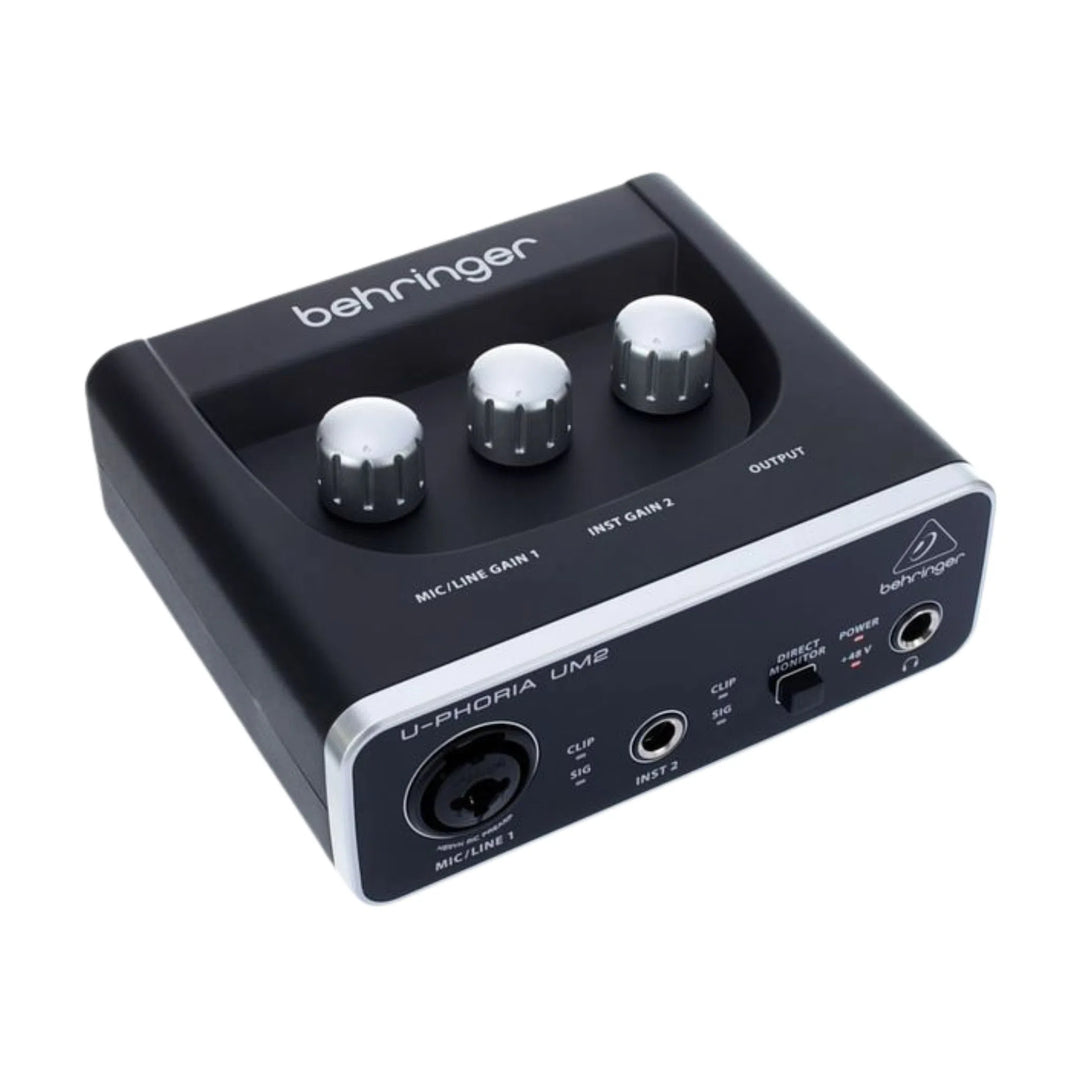
U-Phoria UM2
- 100% Authentic
- Free Same-Day Delivery
- Pay Cash On Delivery
- 12 Months Warranty Protection
Behringer U-Phoria UM2 USB Audio Interface
Entry into the world of U-Phoria
The Behringer U-Phoria UM2 is a compact and exceptionally affordable USB audio interface. Ideal for beginners and experienced technicians on a budget, it offers two input and output audio channels and is compatible with both Windows and MacOS for latency-free DAW environments. Despite being the entry model to the U-Phoria series, one of its inputs is equipped with a state-of-the-art, phantom-powered Xenyx preamp, with low self-noise and a rendering that is both detailed and natural. The second is a mic/instrument input, to connect a guitar or a bass. The 16-bit/48kHz AD/DA internal conversion rate meets the basic requirement for professional recording. The U-Phoria UM2 is a quality interface that will deliver a solid and functional basis for the aspiring home-studio producer, while delivering great results.

A studio in a box
The Behringer U-Phoria UM2’s two input and output channels provide everything needed for simple audio recordings. The mic/line XLR combo input provides 48V phantom power for condenser microphones, allowing a vast choice of mics to be used, and is also available as a line input. The second line input is Hi-Z, allowing high impedance instruments such as guitars and basses to be connected without an additional DI box. The Behringer U-Phoria UM2 features a stereo output for monitors on phono sockets, as well as a headphone output. Both output volumes are controlled simultaneously via a single knob on the top of the interface, next to the input gain knobs of the two inputs. A direct monitoring switch is also provided which allows the monitoring of both inputs of the Behringer U-Phoria UM2 without any perceivable latency, an important feature when recording live vocals and instruments.
A gateway to the home studio
The Behringer U-Phoria UM2 is an affordable USB audio interface that provides all the basic requirements for live recording and navigating DAW environments on a computer. The mic/line input and its high-quality preamp can be connected to a studio-grade condenser microphone, which coupled with the Hi-Z input allow vocal and instrumental duets to be recorded effortlessly and to a high standard. The minimalist and portable design of this desktop interface allows it to be taken anywhere, and used in any context, not just musical ones. For instance, YouTubers or podcasters looking for a flexible alternative to a USB microphone will find the U-Phoria UM2 to be an excellent choice thanks to its two inputs and outputs and intuitive interface, with all the important controls at hand.
About Behringer
The company, which was founded in Germany by Uli Behringer and now manufactures its products in China, has been known for affordable and great-value equipment since its very first product, the Studio Exciter F. An array of mixing consoles (such as the Eurodesk MX8000), signal processors, and later sound amplification and monitoring equipment, has made it possible for countless musicians to fit out their home studios, practice rooms, and mobile PAs within budget limits that were previously unthinkable. The acquisition of other companies, including Midas, Klark Teknik, and TC Electronic, meant that new product groups were added - and also resulted in the technical expertise of these companies being incorporated into product development.
A sturdy companion
The Behringer U-Phoria UM2 performs equally well "on the road”, thanks to its compact and robust metal casing, which can fit in a pocket and handle a few minor bumps during its many travels. It is also durable and USB-powered, so no external PSU is required for operation. Mobile recording with a high-quality condenser microphone is just as possible as playing back audio tracks from a laptop on stage, even in improbable places! Unlike the larger audio interfaces in the series, the UM2 does not have MIDI connectivity. However, this is unlikely to be a significant issue, since most modern keyboards and other MIDI gear are usually equipped with a USB interface as standard to transmit MIDI to a computer.